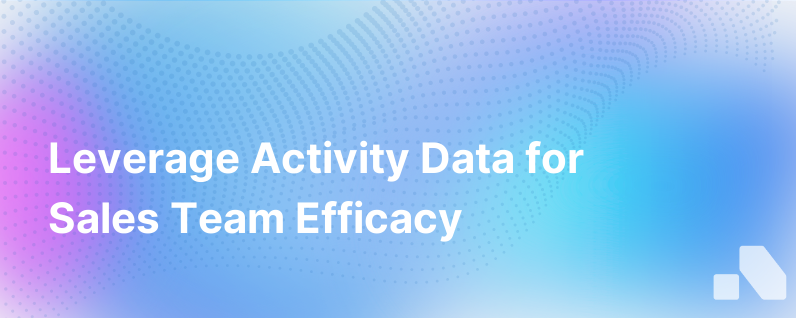
In today's highly competitive business landscape, sales teams are under constant pressure to not just meet their targets but to exceed them. Data is ubiquitous, yet it's not the abundance but the application of data that confers a competitive edge. Activity data, which encompasses all interactions between a sales rep and potential customers, is a goldmine for improving sales efficiency and effectiveness. Harnessing this type of data can enlighten sales strategies and enable teams to operate at peak performance.
Two Key Ways Activity Data Can Amplify Sales Effectiveness
Granular Insights for Tailored Engagement
Activity data is like a series of revealing snapshots of the buyer’s journey. Each email opened, each click, and each conversation holds key insights into a prospect's interests and readiness to buy. By examining these actions, sales professionals can discern patterns and preferences, which aid in the personalization of follow-ups and pitches.
1. Targeted Communication
Gone are the days of one-size-fits-all sales techniques. Today, personalization is the heartbeat of effective selling. Every potential customer has unique needs, pain points, and motivators. Activity data gives sales teams the ammunition needed for personalized communication—that which resonates at an individual level.
Consider a prospect who has repeatedly visited your website's pricing page and spent considerable time on case studies. This interest footprint suggests they're evaluating potential ROI or seeking validation from successful use cases. A sales rep can leverage this insight, tailoring their outreach to highlight cost-benefit analyses or bringing customer success stories to the forefront of the conversation.
Moreover, if a prospect regularly opens emails or engages with content that focuses on a particular feature or problem-solving aspect of the service, their interest is clear. Sales reps can capitalize on this by providing deeper insights, scheduling demos, or facilitating discussions that center around these preferred topics.
2. Optimized Timing
Timing is often the difference between closing a deal and missing an opportunity. Activity data provides a glimpse into when a prospect is most engaged, which can significantly enhance the timing of communications. By analyzing open rates, click-through times, and response patterns, sales reps can pinpoint the optimal moments to reach out.
For example, if the data shows that a prospect often reads emails first thing in the morning, a savvy sales rep would schedule their email to hit the prospect's inbox just before this time to increase visibility. If a prospect tends to browse your product pages late in the afternoon, aligning a call or demo around this time could see higher engagement rates, since it aligns with the prospect’s natural information-gathering pattern.
Enhanced Strategy Through Data-Driven Decision Making
With a myriad of tactical decisions to be made, a sales team's strategy can quickly become unfocused or outdated. Activity data provides a factual basis for decision making, which is crucial for the adaptation and refinement of sales tactics.
1. Prioritization of Leads
Not all leads are created equal. Without proper prioritization, sales reps can waste time and energy pursuing prospects with lower probabilities of conversion. Activity data serves as a metric by which to score leads and triage them according to their level of engagement and potential for conversion.
This concept of lead scoring—assigning a numerical value to each prospect based on their interactions—converts activity data into actionable insights. For instance, a lead who frequently engages with content, has attended a webinar, and has initiated contact may score highly and be categorized as a hot lead. High-score leads can then be prioritized for follow-ups and more personalized attention, ensuring that efforts are directed where they're likely to make the most impact.
2. Streamlining Sales Processes
Analyzing activity data can highlight bottlenecks and inefficiencies in the sales process. For instance, if data reveals that prospects often stall at a particular stage of the sales funnel, there may be an underlying issue in the sales messaging or a need for additional supporting material at this stage.
In this context, A/B testing becomes an invaluable tool. By implementing slight variations in approach—for example, changing the structure of sales emails or the timing of follow-up calls—teams can rely on activity data to assess what works best and refine their sales processes accordingly.
Icing on the Cake: The Predictive Power of AI
The future of sales lies in predictive analytics. Now, sophisticated AI platforms like Aomni go beyond mere description and retrospection. These solutions leverage machine learning algorithms to sift through vast amounts of activity data and forecast individual prospect behavior. They identify patterns that a human might overlook, making highly accurate predictions about which prospects are primed for a purchase and when.
Aomni's AI-driven insights free up sales reps to concentrate on what they do best—build relationships and close deals—while the platform handles the heavy lifting of data analysis. With AI, activity data is not just a passive record but an active guide, steering the sales strategy in real-time.
Bringing It Together
In harnessing the full potential of activity-dense information, sales teams acquire laser-like focus in their outreach efforts and become adept at anticipating the needs and actions of their prospects. Moreover, when activity data is augmented by AI platforms like Aomni, sales teams are armed not just with a retroactive ledger of customer interactions but with a forward-looking radar.
By adopting these two approaches—utilizing granular insights for tailored engagement and leveraging data to enhance overall sales strategy—your sales team can stand head and shoulders above the competition. This combination of nuanced communication and strategically allocated attention is the cornerstone of a data-driven, modern selling organization.